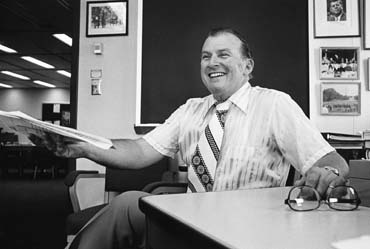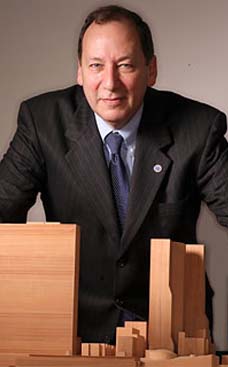
When Mr. Kennedy was a senator running for president in 1960, Dr. Kauffman urged Mr. Sorensen to write a speech challenging college-age youth to participate in something like what became the Peace Corps, Dr. Kauffman said in an interview with The Wisconsin State Journal in 2000. This was far from the only or even the first suggestion of the idea, however. Henry S. Reuss, a Wisconsin congressman, and Senator Richard Neuberger of Oregon had submitted bills in early 1960 to study an overseas volunteer corps. A privately financed group, International Voluntary Service, had been doing similar work, and Senator Hubert H. Humphrey had long advocated such an initiative. As training director of the Peace Corps, Dr. Kauffman assigned a training officer to each of the 70 college campuses used for training to ensure at least a degree of uniformity. He designed a six-day-a-week, 7 a.m.-to-10 p.m. training regimen that included technical job skills, language, the dangers of Communist subversion, medical studies and physical education. In “Agents of Change: A Close Look at the Peace Corps,” David Hapgood and Meridan Bennett wrote in 1968 that the trainees had less autonomy than a college freshman. “He was bedded in a dormitory, tumbled out at an arbitrary hour, fed in a prescribed place at a prescribed time,” they wrote. “He hardly had time to sleep far less to think — it was like boot camp.”
Obituary for Joseph Kauffman, Peace Corps' first Director of Training from 1961 to 1963
Joseph F. Kauffman, 84, Who Helped to Start Peace Corps, Dies
University of Wisconsin, Madison/University Archives
Joseph F. Kauffman in 1977 at the University of Wisconsin, Madison. Dr. Kauffman moved to academia after several jobs in Washington.
By DOUGLAS MARTIN
Published: October 3, 2006
Joseph F. Kauffman, an educator who helped start the Peace Corps and ran the basic training designed to turn its recruits into effective volunteers, then led the fight against war protesters at the University of Wisconsin, died on Sept. 29 in Madison, Wis. He was 84.
The cause was cancer, the University of Wisconsin said in a statement.
As training director of the Peace Corps, Dr. Kauffman assigned a training officer to each of the 70 college campuses used for training to ensure at least a degree of uniformity. He designed a six-day-a-week, 7 a.m.-to-10 p.m. training regimen that included technical job skills, language, the dangers of Communist subversion, medical studies and physical education.
In “Agents of Change: A Close Look at the Peace Corps,” David Hapgood and Meridan Bennett wrote in 1968 that the trainees had less autonomy than a college freshman.
“He was bedded in a dormitory, tumbled out at an arbitrary hour, fed in a prescribed place at a prescribed time,” they wrote. “He hardly had time to sleep far less to think — it was like boot camp.”
Dr. Kauffman, who was president of Rhode Island College from 1968 to 1973, began his career by opening an office of the Anti-Defamation League in Omaha, where one of his friends was Theodore Sorensen, then a law student and later a speechwriter for John F. Kennedy.
When Mr. Kennedy was a senator running for president in 1960, Dr. Kauffman urged Mr. Sorensen to write a speech challenging college-age youth to participate in something like what became the Peace Corps, Dr. Kauffman said in an interview with The Wisconsin State Journal in 2000.
This was far from the only or even the first suggestion of the idea, however. Henry S. Reuss, a Wisconsin congressman, and Senator Richard Neuberger of Oregon had submitted bills in early 1960 to study an overseas volunteer corps. A privately financed group, International Voluntary Service, had been doing similar work, and Senator Hubert H. Humphrey had long advocated such an initiative.
Joseph Frank Kauffman was born on Dec. 2, 1921, in Providence, R.I. He sang in big bands until joining the Army in 1942. He was in the infantry in North Africa and Italy. He then graduated from Denver University, and earned a master’s degree from Northwestern University and a doctorate from Boston University.
His early jobs included assistant to the president of Brandeis University and executive vice president of the Jewish Theological Seminary. In 1960, he joined a 15-member committee to establish the Peace Corps and was training director until 1963. He then held several posts in Washington, including director of higher education for the American Personnel and Guidance Association.
In 1965, he joined the University of Wisconsin as dean of student affairs. The New York Times that year quoted him as criticizing the “crass opportunism” of many university faculty members in putting their own interests ahead of students’. He worked to give students more autonomy.
Two years later, he found himself blockaded in his offices by students protesting campus recruiting by munitions makers. He wrote the statement denying students’ demands and urged the use of the police to clear them out of a building.
The man who described himself as a bleeding-heart type, soon tired of this disciplinarian role, and he left to become president of Rhode Island College, where he expanded the faculty by a third, started new majors and programs and banned freshman hazing.
In 1973, he returned to the University of Wisconsin to teach and was executive vice president of the University of Wisconsin system from 1980 to 1983. He wrote books and articles on the selection of university presidents and retired in 1987.
Mr. Kauffman’s wife of 56 years, the former Gladys Davidson, died in 1999. He is survived by his sisters Charlotte Martin of Sandwich, Mass., and Evelyn Blumberg of Falmouth, Mass.; his daughter, Marcia Krasnow of Norwood, Mass.; and his son, G. Frank, of Los Angeles.
During the Wisconsin protests, Dr. Kauffman reminded the students denouncing administrators as fascists that he and chancellor Robert W. Fleming, both combat veterans, were “the only two people in the room who had actually fought fascists.”













